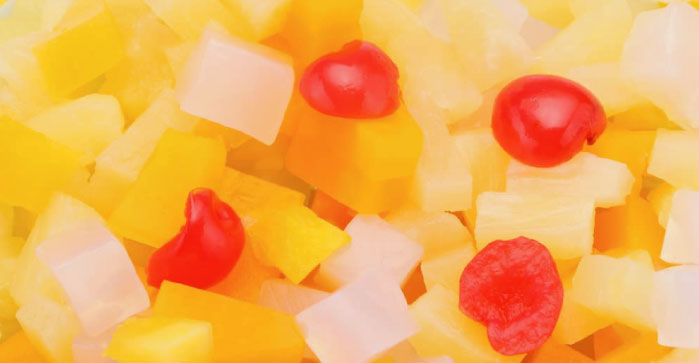Conservas
Ene. 31, 2024
Frutas en conserva: bondades para una alimentación saludable
Ever wondered if reaching for that can of peaches or pineapple is a good choice for your health? In this deep dive, we’ll talk about the health benefits of canned fruit, debunk common misconceptions and provide practical tips for incorporating canned fruit into a healthy diet.
Let’s explore how canned fruit can be a convenient, nutritious and budget-friendly option for your daily fruit intake.
Canned Fruit Nutrition
“We hear it all the time, ‘Fresh is best,’ but canned fruits can be just as nutritious,” says Chelsea LeBlanc, RDN, owner of Chelsea LeBlanc Nutrition in Nashville, Tennessee.
Canned fruits provide carbohydrates for energy, fiber for digestion and vitamins and minerals to keep us healthy. Let’s break down the nutritional information of three popular canned fruits, coming from the USDA’s FoodData Central.
Peaches
Here is the nutritional information for a 1-cup serving of peaches canned in peach juices, per the USDA:
Calories: 120
Carbohydrates: 30g
Dietary Fiber: 3g
Total Sugar: 30g
Added Sugar: 0g
Protein: 1g
Total Fat: 0g
Saturated Fat: 0g
Cholesterol: 0mg
Sodium: 10mg
Vitamin A: 60mcg
Vitamin E: 1.1mg
Potassium: 290mg
Pineapple
Here is the nutritional information for a 1-cup serving of pineapple canned in pineapple juices, per the USDA:
Calories: 140
Carbohydrates: 35g
Dietary Fiber: 2g
Total Sugar: 33g
Added Sugar: 0g
Protein: 1g
Total Fat: 0g
Saturated Fat: 0g
Cholesterol: 0mg
Sodium: 5mg
Vitamin C: 18mg
Magnesium: 43mg
Potassium: 352mg
Pears
Here is the nutritional information for a 1-cup serving of pears canned in pear juices, per the USDA:
Calories: 130
Carbohydrates: 34g
Dietary Fiber: 4g
Total Sugar: 30g
Added Sugar: 0g
Protein: 0.5g
Total Fat: 0g
Saturated Fat: 0g
Cholesterol: 0mg
Sodium: 10mg
Vitamin C: 3mg
Copper: 122mcg
Potassium: 190mg
All of these fruits are good sources of micronutrients like potassium, vitamin C, vitamin A and more. And, since they are canned without syrup, they do not contain any added sugar. Plus, each offers an impressive amount of fiber to help support heart health and healthy digestion.
Health Benefits of Canned Fruits
They’re Budget-Friendly
Canned fruits are almost always less expensive than fresh fruit, making them a more cost-effective option for those on a budget. Plus, since they last for years to come, you don’t have to worry about rapid spoilage and wasting food. Opting for store brands, rather than higher-priced name brands, is another great way to help your dollar go further.
They’re Preserved at Peak Ripeness
Did you know canned fruits are picked at their peak ripeness and then canned within a matter of hours? This helps ensure that they retain peak nutrition and flavor for whenever you’re ready to enjoy them. LeBlanc affirms, “Since they’re packed at the peak of freshness, you can keep eating those juicy summer peaches all year long!”
They’re Packed with Nutrients
Just like fresh and frozen fruits, canned fruits are a great source of essential nutrients like fiber, vitamins and minerals. According to a 2019 umbrella review published in the International Journal of Food Sciences and Nutrition, fruits and veggies support our overall health and help reduce the risk of certain diseases like cardiovascular disease and cancer.
LeBlanc even points to a recent 2020 review published in Nutrients that showed upping your fruit and vegetable intake (including canned fruits) might promote better mental health. The study showed high intakes of these produce items may promote greater optimism, less stress and fewer depression symptoms. However, since the studies in this review used different methods, comparing their results is not always straightforward and more research is needed to help clarify the relationship.
They’re Convenient
Canned fruits can be a huge timesaver, with little to no prep work involved.
LeBlanc points out, “The current Dietary Guidelines for Americans recommends adults eat 1½ to 2 cups of fruit each day, but only 1 in 10 Americans are eating enough fruits and veggies. Canned fruits make it easy to meet these recommendations. They’re pre-cut and ready to eat—saving you valuable time washing, peeling and chopping.”
This makes canned goods ideal for older adults, those with reduced mobility, those who lack kitchen facilities and busy professionals who are pressed for time.
Tips for Including Canned Fruit in a Healthy Eating Pattern
Canned fruits can absolutely be a healthy addition to your eating pattern, but there are a few things to look out for. Here are some tips on how to incorporate canned fruits into your healthy eating pattern:
- Choose Fruit in Water or Natural Juice: Opt for canned fruits in water or their own juice rather than sweetened syrups to avoid added sugars. Need more pointers when it comes to picking out canned foods? Read our full guide.
- Don’t Dismiss Store Brands: There’s a common misconception that store brands are lower quality compared to their branded counterparts. However, this is far from the truth. In reality, companies such as Pacific Coast Producers, which supply store-brand products, are committed to following the best practices in the industry. Notably, Pacific Coast Producers takes pride in how their tomatoes are picked off the vine and canned in less than five hours. Grocery stores nationwide have affordable canned options, which can allow you to enjoy nutritious fruits and vegetables with less financial strain.
- Add Canned Fruit to Your Recipe Routine: Normally use fresh fruits in your smoothies, salads, desserts and parfaits? You can easily swap for canned fruits to save money, time and prep work. We also love using canned fruit in recipes like Easy Peach Cobbler and Cabbage, Tofu & Edamame Salad.
Source: Eatingwell
VOLVER A NOTICIAS


